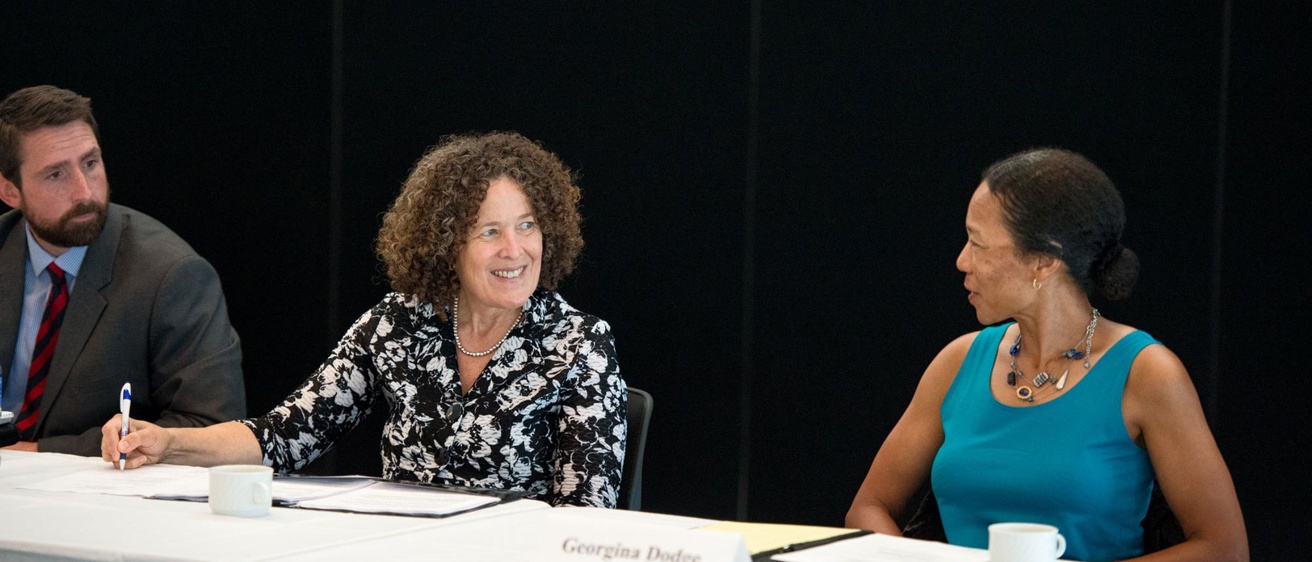A top Justice Department official hailed the University of Iowa as a leader for its commitment to reducing the incidence of sexual assaults on campus and said other universities across the country are replicating the UI model.
"It’s that kind of leadership and that kind of grounding that creates a culture and a community that doesn't tolerate that kind of violence," says Bea Hanson, principal deputy director of the U.S. Department of Justice Office on Violence Against Women. "That doesn’t happen everywhere."
Hanson made the comments Aug. 17 during a stop at the UI as part of a national tour commemorating the 20th anniversary of the Violence Against Women Act.
Her visit with key members of the UI Anti-Violence Coalition was among similar stops in 45 communities in 20 states in which Hanson talked about the impact of the federal legislation and the challenges ahead.
During her 90-minute roundtable discussion, Hanson commended the UI for its efforts in reducing violence against women and said other universities, such as the University of North Carolina at Chapel Hill, are beginning to institute policies, programs, and training first launched at the UI.
"I want to thank you for your leadership," Hanson said.
Since 2006, the UI has received five federal grants totaling more than $1 million from the U.S. Department of Justice Office on Violence Against Women. Over the years, the money has been used to create policies on sexual misconduct, stalking, and dating/domestic violence, as well as prevention education that is mandatory for all incoming undergraduates and graduate students.
In 2011, bystander education was added to On Iowa!, the incoming students' immersion program, and, two years later, became a requirement for resident assistants (RAs) and other housing staff. Since then, bystander education has expanded to include all fraternity and sorority life members, new student-athletes, and some rhetoric classes.
Monique DiCarlo, UI sexual misconduct response coordinator and deputy Title IX coordinator, says the federal money was also used to provide training for judicial administrators and law enforcement officer in the areas of sexual assault, dating/domestic violence, and stalking.
"Many officers said it was the first time they had received extensive training on sexual assault, dating/domestic violence, and stalking separate from the law enforcement academy," DiCarlo says. "They were very appreciative of the opportunity and the expertise of the trainer we brought to campus."
Federal money also allowed the UI to establish a multidisciplinary campus team—the UI Anti-Violence Coalition—that meets monthly to discuss policies and procedures, education and training, and system response.
"The goal of all of this work has been to keep victims safe and hold offenders accountable," DiCarlo said. "It’s a goal that can only be achieved through ongoing collaboration."
Hanson says she and her staff would consolidate the information they gathered during their cross-country tour and issue a report no earlier than October.
DiCarlo says it was an honor to be included in Hanson’s national tour.
"It was really moving to reflect with campus and community partners on how far we have come—putting the timeline together was incredible," she said. "The visit also provided motivation for current and future projects."
Many resources are also available across the UI campus for students, survivors of sexual assault, and family members, including:
- Nite Ride
- Safe Ride Taxi Service
- Rape Victim Advocacy Program (RVAP) 24-hour Crisis Line: (319) 335-6000
- Women’s Resource & Action Center (WRAC)
- The UI Office of the Sexual Misconduct Response Coordinator
